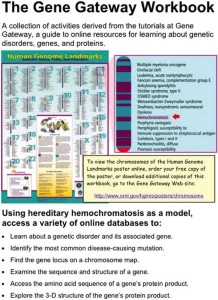As bioinformatics grows up into a modern scientific discipline, the rules are being developed alongside its newest tools. The scientific smackdown that arose from discovery of the collagen-like protein from preserved T-Rex protein only illustrates these developments.
To make matters worse, simple bioinformatics tools are already becoming outdated. Instead of examining a few simple lines of As, T, Cs and Gs, scientists are more interested in seeing how these letters interact with each other in the diversity of cells across many living organisms. For instance, some scientists are interested in gene regulatory networks, which can be thought of as “interlinked sets of genes that are regulated in a coordinated fashion in cells and tissues” (-PZ Myers, Pharyngula)
To understand the future and present of bioinformatics, our students must be savvy to navigate through the available (and free) tools that can augment their science education.
 Bioinformatics Tools from the NCBI
Bioinformatics Tools from the NCBI
The Gene Gateway workbook is a collection of five activities, complete with step-by-step instructions designed to introduce new users in using bioinformatics tools from the OMIM, Gene Reviews, NCBI Map Viewer, Entrez Gene, Gene Bank, Swiss-Prot, Protein Data Bank, and Protein Explorer.
- National Center for Biotechnology Information (NCBI)
- Gene Gateway Workbook PDF
- Human Genome Landmarks Poster
- Online Mendelian Inheritance in Man
- Gene Tests
- Map Viewer
- Entrez Gene
- SwisProt
- Protein DataBank
- Gene and Protein Database Guide
- Database Manuals
Going Further: BLAST Activity with Insulin
Investigate the Insulin protein and the mutations which cause disease. This activity is an introduction to using and interpreting the Blast database. Inquiry extensions involve comparing human insulin to insulin in other species. (From K12 Outreach – Fungal Genomics)
Using Jmol